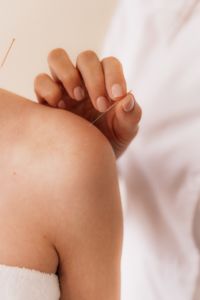High blood pressure is a serious health condition that affects 1 out of 3 American adults. Doctors call high blood pressure the silent killer because it often has no symptoms until a person suffers a heart attack or a stroke. When your blood pressure is too high, it damages blood vessels and arteries and decreases the amount of oxygen getting to your heart. It can also damage your kidneys, eyes, and other organs.
It’s important to get your blood pressure checked regularly so you can catch an upward trend before it becomes dangerous. You may need to take medication to lower your blood pressure. Even with medication, many people struggle to lower their numbers enough. This is where lifestyle changes and heart-healthy habits can help. Heart-healthy habits are also recommended for anyone who doesn’t have high blood pressure as a preventative measure. Some people with mildly high blood pressure may be able to lower their numbers with natural measures alone, but you should always follow your doctor’s advice and take medication if needed.
Here are three things you can do every day to lower your blood pressure:

1. Change Your Diet
Your heart health is intricately linked to your diet. People who eat the “Mediterranean” diet, which includes less red meat, more fish, legumes, and whole grains than a typical American diet, have a greatly reduced risk of heart disease. Studies have found that people who follow the Mediterranean diet have a 50-70% lower risk of recurrent heart disease than those who followed a diet similar to the AHA’s step-1 diet.
You can glean the same benefits from other cultural diets. Traditional Japanese cooking, for instance, also emphasizes vegetables, fish, and healthy grains like rice.
Healthy eating doesn’t need to be boring or flavorless. There are thousands of cookbooks filled with heart-healthy recipes inspired by world cuisines. Many of them include herbs and spices that can take the place of salt, sugar, and saturated fat.
People with high blood pressure should avoid eating excessive amounts of salt, defined as more than five grams per day. The best way to cut back is to stop eating pre-packaged and highly processed foods. This will also lower your intake of sugar and harmful chemical additives.
Heart-healthy diets come in many flavors, but they all have one thing in common: real, fresh food. Try to eat fish at least twice per week and limit red meat to once per week. Choose poultry or vegetarian options like beans or tofu instead of red meat. Healthy fats like olive oil and fish oil can help lower cholesterol and reduce your risk of cardiovascular problems. Vegetables, fruits, and whole grains should be eaten several times a day. Try to eat a rainbow of colors. The colors in vegetables and fruits are formed by chemicals that have powerful health benefits. Dark green, orange, and purple vegetables are especially beneficial.

2. Manage stress
You may have heard people say, “don’t get your blood pressure up,” when someone is upset. Most people don’t experience dangerous rises in blood pressure during stressful moments, but stress does cause our bodies to produce chemicals that raise blood pressure. How much it goes up and how long this spike lasts depends on the person and the situation. It should be a temporary effect–our fight or flight response, but when stress becomes chronic, high blood pressure can become chronic too.
Some people have high blood pressure purely because of this stress response. Stress leads to a chain of issues that affect blood pressure, including lack of sleep, lack of exercise, and unhealthy eating. Chronic stress also puts you at a higher risk for anxiety and depression, both of which are linked with poorer cardiovascular health. It’s therefore important for all of us to manage stress and keep our fight or flight response from becoming a daily habit.
There are many ways to manage stress. Engaging in a daily meditation or yoga practice has proven benefits for stress reduction and heart health. Owning a pet has been shown to lower blood pressure, especially while you are petting or playing with them. Massage also makes the body produce chemicals associated with relaxation and lower cortisol levels. Anything you can do in your day that makes you happy and takes your mind off your worries will be good for you.
It’s also important to avoid the things that drive stress levels up. Many people today are bombarded by a flood of information, much of which is negative and stressful. Unplugging is an important part of stress reduction in modern life. This doesn’t mean you have to tune out the world, but it’s healthier to set a time once a day or twice a week to tune in and then focus on other things outside of that time.

3. Consider Alternative Treatments
We want to be clear that the word “alternative” doesn’t necessarily mean an alternative to medication. Rather, these treatments can be complementary. Some doctors recommend lifestyle changes and natural treatments to patients with high blood pressure so they can take less medication. Talk to your doctor about your goals and options. Here are some treatments to consider:
Chiropractic Care: A 2020 review of studies on the relationship between chiropractic care and blood pressure showed “promising” results. Spinal adjustment helps to regulate the nervous system. Since the nervous system regulates blood pressure, it makes sense that a healthier nervous system would lead to lower blood pressure. Many people have found that chiropractic adjustment is an effective part of their blood pressure treatment plan.
Acupuncture: Acupuncture may help lower stress and decrease pain, both of which can contribute to high blood pressure. Some studies show short-term effects on blood pressure, while others show longer-term effects. More research is needed, but many people swear by acupuncture for a range of health problems, including high blood pressure.
Herbs and Supplements: If you take any medications, you should ask your doctor before trying an herb or supplement. Some options to consider include Hawthorn, CoEnzyme Q10, and folate. People with high blood pressure should avoid licorice root, guarana, ginseng, and other herbal and non-herbal stimulants, including caffeine.
Exercise: Exercise is a proven treatment for most cardiovascular problems and other health issues. Getting at least thirty minutes of moderate physical activity per day will promote heart health and could lower your blood pressure. Losing weight, especially around your midsection, can also lower blood pressure and take some strain off your heart.
Wellness Care in Tennessee
At Stanlick Chiropractic, we offer spinal adjustment, massage, and nutritional advice for people trying to improve their health and quality of life. Schedule a consultation today and find out how chiropractic care can contribute to your blood pressure treatment plan.

